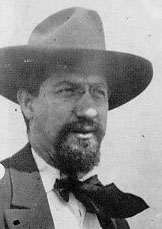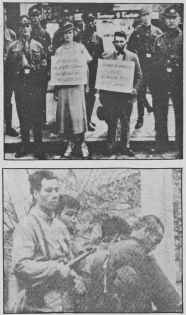Most Recent Additions
Howard Besser
Brazil Impeachment & Left Media
As Bill Weinberg points out (see page 14, this issue), much of the left media shamefully supports odious forces simply because they oppose the U.S. A contemporary example of a significant skewing the facts can be seen in its overwhelmingly biased coverage of the 2016 impeachment of Brazil’s president, Dilma Rouseff.
Nov 17, 2016 Read the whole text...
Bill Weinberg
How the American Left Abets Genocide in Syria
Today, many American leftists are accepting and even promoting the propaganda of the dictatorial regime of Syrian President Bashar Assad. They overwhelmingly stand on the side of fascism and genocide in that ravaged country.

Nov 8, 2016 Read the whole text...
Leila Al Shami
The Legacy of Omar Aziz
Building autonomous, self-governing communes in Syria
“A revolution is an exceptional event that will alter the history of societies, while changing humanity itself. It is a rupture in time and space, where humans live between two periods: the period of power and the period of revolution. A revolution’s victory, however, is ultimately achieving the independence of its time in order to move into a new era.”
Nov 5, 2016 Read the whole text...
Beth Frage
Ramblings of a Narcissist
Every once in a while you run into one of those books or pieces of music or art, that no matter what its faults, force you to see your life from an entirely different perspective. Lasch wrote a couple of books that did that for me, even though I was left with a distinct distaste for his oversimplified Calvinistic judgments. Not that it wouldn’t be nice at times to stand on the mountain with god and write down the ten, and then hold them like a thunderbolt inside to ride through life’s uncertainties, but even if life may have been easier with Jehovah’s words inside you, that just isn’t where it’s at nowadays, and I don’t think many of us really regret that.
Nov 1, 2016 Read the whole text...
Primitivo Solis (David Watson)
Christopher Lasch’s “War of All Against All”
Review
a review of
Christopher Lasch, The Culture of Narcissism: American Life in an Age of Diminishing Expectations (New York: Norton, 1979)
“This book,” writes Christopher Lasch in the Preface to his provocative Culture of Narcissism, “describes a way of life that is dying—the culture of competitive individualism, which in it’s decadence has carried the logic of individualism to the extreme of a war of all against all, the pursuit of happiness to the dead end of a narcissistic preoccupation with the self.” [1]
Oct 28, 2016 Read the whole text...
Fifth Estate Collective
Detroit Seen
Usually when a publication such as ours disappears for several months it is due to money problems, political differences among the staff or a combination of the two. However, we can happily report that neither of these maladies caused our hiatus, but rather a combination of sloth and self-indulgence. The days and then the months just slipped away as we traveled, tended our gardens, took leisurely bike-rides, worked our dumb jobs and generally laid about as much as we could. Now that our mail has slacked off to almost zero, and the rumors of our demise have begun to reach us once again, we figure it is time for another assault against contemporary reality. Perhaps, though, it understates our intellectual activity to suggest we were only doing the above mentioned pastimes, because every article in the paper has been the subject of discussion and debate; some of it extending back several months. This newspaper is much like letter-writing: you get back in accordance with what you send out. In that we value greatly the input we receive from readers, you probably can expect to see more of this paper during the winter months ahead...
Oct 28, 2016 Read the whole text...
anon.
Warning to the Pope
Stay out of Detroit
You, M. Pope, are a scoundrel and a cur. The more “personable,” the more popular and accessible you become, the more you inspire our absolute loathing for all that you represent: the self-alienation of the human subject and the invasion of the human spirit by the forces of domination. Let it be clear: we are your implacable enemies. Perhaps it is true that it is not you who pushes the button which sends screaming rocket bombs to annihilate whole populations, or who orders the dumping of murderous chemicals into the water supplies, or who dispatches the police to assassinate poets and rebels. And obviously it is true that the hullabaloo that you have stirred up with your visit to the United States should raise no more interest than the arrival of some anonymous charlatan astrologer. But you haven’t been ignored; you have been recognized, feted, adored, praised, gazed upon, cheered, and taken seriously. And you do represent the internalization of the forces which make it possible for the aforementioned crimes to continue unavenged. You are the living incarnation of the plague which legitimizes oppression, promotes passivity, and defuses rebellion. We are warning you: stay out of Detroit if you wish to avoid a sound, well-deserved thrashing.
Oct 28, 2016 Read the whole text...
Fifth Estate Collective
Assassin of Carlo Tresca Shot in NYC
In a scene that could have been taken from the movie version of “The Godfather,” four gunmen rushed into a small Italian restaurant on July 12 and shot to death Carmine Galante—the mafioso capo di tutti capi—the boss of all bosses of the Mafia.

This not unusual manner of demise for a scummy gangster chieftain raised few eyebrows or roused little interest in what is part of an ongoing battle between the old Bonanno and Gallo families for control of the New York City rackets.
Oct 27, 2016 Read the whole text...
anon.
Chrysler Sabotage
Party Time!
It’s a rare case when someone can go home from the job and say they’ve done a constructive day’s work, and an even rarer case when 4,000 people from the same place can say it at the same time.
But that was exactly the case September 21, when the Chrysler Corporation was forced to close its Lynch Road Plant in Detroit because of worker sabotage and vandalism.
Oct 27, 2016 Read the whole text...
Fifth Estate Collective
Shorts
Sweet Music-Muzak—that background music featured in supermarkets, office buildings and factories is invading the People’s Republic of China. The Western regional director of the-Muzak Corporation, Bert Mitchell, has told Pacific News Service that a Muzak salesman has just returned from a very successful sales trip to the Chinese mainland. According to Mitchell—in his words—“He spent a whole month there, selling our systems. The Chinese were crazy about them.”
Oct 27, 2016 Read the whole text...
Fifth Estate Collective
Staff and Contributors
FIFTH ESTATE, #299, October 22, 1979, vol. 14, no. 4
Alan Franklin
Ralph Franklin
E. B. Maple
Tina Nachalo
Mr. Venom
Primitivo Solis
Marilyn Werbe
Peter Werbe
John Zerzan
Brenda Sabbagh
Larry Talbert
The Fifth Estate Newspaper (ISSN-0015-0800) is published bimonthly at 4403 Second Ave., Detroit MI 48201; phone (313) 831–6800. Office hours are sporadic, so call before coming down. Subscriptions are $4.00 for 12 issues; $6.00 for foreign. Call 259–1888 for retail sales outlets. Second-class postage paid at Detroit, Michigan. No copyright. No paid advertising accepted.
Oct 27, 2016 Read the whole text...
Fifth Estate Collective
Walla Walla Prison Revolt Continues
During the last five months, the ongoing battle between prisoners and prison administrators over the inhuman conditions at the Washington State Prison at Walla Walla, Wash., has escalated to the savage beatings of hundreds of people by guards after an unprecedented one month lockdown, and 230 prisoners from Eight Wing have been forced to camp out in the “big yard.”
Oct 27, 2016 Read the whole text...
Various Authors
Letters to the Fifth Estate
Dear Fifth Estate,
After reading the June 19th issue [FE #298, June 19, 1979] I would like to make some comments regarding your attack on “civilization” and your glorification of hunter/ gatherer life.
First, I agree with the point that increased technology does not increase leisure time and in fact has the opposite result. However this is not a new “revolutionary” theory. Marvin Harris has made the same point in Culture, People, Nature several years ago, and has drawn similar conclusions about the “virtues” of technological progress.
Oct 25, 2016 Read the whole text...
Primitivo Solis (David Watson)
Mexican Oil Spill Disaster
Industrial Plague Widens
The gruesome tailspin of industrialism continues unabated in every sphere. Industrial society is at a malignant stage of decline with events like the Ixtoc 1 oil disaster providing all the more evidence of its impending collapse.
The oil spill, caused by the explosion of an exploratory well drilled by Petroleos Mexicanos (Pemex), the national state-controlled oil company of Mexico, began spewing oil into the Gulf on June 3 at the rate of 4,500 tons a day, some 500 miles south of Texas off the coast of the state of Campeche.
Oct 20, 2016 Read the whole text...
anon.
China Supports US on Taiwan
Now that the Hua Kuo-feng faction of the Chinese Communist party is firmly in control of the People’s Republic any number of Maoist concepts have been slated for the waste basket of history.
One of the most recent to go is the late Chairman’s guerrilla strategy of “people’s war” which long insisted that men, not weapons, were the key factor in war and had China preparing for a guerrilla defense against an invader.
Oct 13, 2016 Read the whole text...
anon.
Terrorists’ Revenge
While waiting at a traffic light in the city of Karlsruhe, West Germany, Chief Prosecutor Siegfried Buback was assassinated just as the light turned green.
Along with his chauffer and a bodyguard, Buback was killed by two people riding a stolen motorcycle, when they drove up to the right side of his limousine and emptied more than thirteen shots into the car with a submachine-gun.
Oct 13, 2016 Read the whole text...
Fifth Estate Collective
Canada Hides Slayer
Murderer of Laureano Cerrada Santos permitted to immigrate
On the front page of the latest issue of Black Flag (organ of the Anarchist Black Cross) is the picture of Spanish anarchist Laureano Cerrada Santos with the word MURDERED printed under it in large type.
According to Black Flag, Cerrada, who fought in the Spanish revolution and later became a skilled forger in passports and Spanish food rationing coupons, was shot to death in the streets of a Paris suburb by a Spanish secret agent last October.
Oct 10, 2016 Read the whole text...
Fifth Estate Collective
Criticism/Self-Criticism
Germany 1936, China 1977

George Orwell’s 1984, in which he potently describes a totalitarian society of the future, has been used by both capitalists and communists in describing each other’s society. The saddest thing of all is that they’re both right.
The photos on this page show the military forces of Germany (1936) and China (1977) practicing the art of criticism/self-criticism in attempts to clear the nation state of unwanted elements.
Oct 8, 2016 Read the whole text...
Fifth Estate Collective
Ammunition Books
PORTUGAL: The Impossible Revolution? Phil Mailer
The still unfinished story of the Portuguese upsurge of 1974–75. An eye-witness account of a deeply involved spectator. A new type of historiography with the view from different groups vying for power and the workers fighting for a new life.
London Solidarity, $5.00 (also available in hardback, upon request $10.00)
Oct 7, 2016 Read the whole text...
Fifth Estate Collective
Events Calendar
Cass City Cinema-1st Unitarian Church (Cass & Forest—red door), 7:30 & 10 pm Adm. $1.50. Sundays films at 7:30 only.
4–29 & 30 “Blow for Blow” 1970 Karmitz. (France)
5–6 & 7 “Womens Film Festival Weekend”.
5–13 & 14 “Hearts and Minds” 1974 (Peter Davis).
5–27 & 28 “The Thousand Eyes of Dr. Mabuse” 1960 (Fritz Lang).
Oct 7, 2016 Read the whole text...
anon.
Poland: 1970–71
There’s no light quite so bright as the glow from a burning government building
a review of
Poland: 1970–71; Capitalism and Class Struggle, Informations Correspondence Ourvrieres (ICO), 117 pages; illustrated, Black & Red, Detroit, 1977.
“Nothing draws a crowd like a burning cop car!”
—late 1960s political graffiti
Really just one other thing does—a burning government building—and the cover picture of this pamphlet showing the blazing Communist Party headquarters in the Polish city of Szczecin graphically illustrates what this pamphlet is really all about: the hatred of the people for their rulers and the accessibility of the oppressors. The violent class combat that shook Poland over six years ago is recounted here from both Polish and other European sources and details the massive worker counter-offensive to a price hike and wage freeze.
Oct 7, 2016 Read the whole text...
John Zerzan
Multinational Unions
The transition from union shop to union world is underway, for unions have proven themselves the only integrative force even marginally capable of dealing with the definitive capitalist crisis, the crisis of participation. But “marginal capability” will not be nearly enough.
It has never been more clear that trade unionism is “ absolutely essential to the survival as well as to the stability of world capitalism. The trend toward the consolidation of unions, their closer integration with the state, and, most recently and remarkably, their development into a global network has finally presented, in fact, an unmistakable picture of modern fascism.
Oct 3, 2016 Read the whole text...
Open Road
State Plays “Musical Dungeons” With SLA
This article first appeared in Open Road newspaper, Box 6135, Station G, Vancouver, Canada.
The long and complicated saga of the now defunct Symbionese Liberation Army (SLA) is still unfolding in the courtrooms and prisons of California. Russ Little, Joe Remiro, Bill and Emily Harris, the group’s four surviving members, are all now serving one or more life sentences each and the Harrises face even more trials growing out of their urban guerrilla activities in 1974.
Oct 3, 2016 Read the whole text...
anon.
The Last SLA Statement
The Symbionese Liberation Army (SLA) undertook a series of urban guerrilla actions in 1973 and 1974 that made world-wide headlines. The assassination of a reactionary school official, the kidnapping of a wealthy heiress and a bank appropriation set off a massive search for the small band. Of the original ten SLA members, six were executed by the Los Angeles Police and the remaining four were captured and sentenced to multiple life imprisonments. The latter—Russ Little, Joe Remiro, Bill Harris and Emily Harris—were interviewed last year by the Bay Area Research Collective (BARC, P.O. Box 4344, Berkeley CA 94704) and related their experiences and assessments of the SLA experience. The Fifth Estate has excerpted sections of that interview and although the full text is not presented, we hope that the major thrust of their feelings and ideas is maintained. The entire interview is available from BARC or Ammunition Books for 75 cents.
Oct 3, 2016 Read the whole text...
Fifth Estate Collective
Detroit Seen
Good news on the financial front: the Fifth Estate is still cruising on the generosity of our growing list of sustainers and those making one-time contributions. Also, a thank you to all of those subscribers who have been renewing over the past few months. One note though: if you received a letter last month stating that your subscription has expired, this will be the last issue you receive unless we hear from you. (Hate to lose anyone, but...)
Oct 2, 2016 Read the whole text...
Fifth Estate Collective
Protests Planned at 2nd Murray Trial
A weekend of international protest activities has been called to coincide with the opening of the second murder trial of Irish anarchist Marie Murray on April 25 in Dublin, according to the London Black Flag office.
Murray and her husband Noel were convicted last year in a frame-up trial for the slaying of an Irish cop following an unsolved bank robbery in that nation’s capital city.
Oct 2, 2016 Read the whole text...
Peter Rachleff
The New Family Therapy
“The development of capital is delinquency and madness. Now everything is permitted; there are no longer taboos, bans. But, in living out various ‘perversions, men and women can lose themselves, destroy themselves, and no longer be operational’ for capital; out of this there appears-the necessity of a community which can reinsert them into the community of capital (to be more exact, this takes on the dimension of a therapeutic community). An ensemble of specialists-therapists will serve as the mediators for this reinsertion.”
—Jacques Camatte, in Invariance Serie III, No. 1
Oct 2, 2016 Read the whole text...
Various Authors
Letters to the Fifth Estate
To the FE:
Let me make some observations regarding the recent debates in the FE on organization, worker’s councils, and so on. I hope you take what I say as friendly criticism rather than as the beginning of a polemic.
First of all, many of the statements in the paper, both by correspondents and by FE staff, display considerable pomposity, as well as a desire to dismiss as idiotic or reactionary the views of opponents. This kind of revolutionary one-upmanship not only fails to clarify the issues; it also risks discouraging the participation of people who doubt their own glibness or literary skill.
Oct 1, 2016 Read the whole text...
High Times
Mexican Dope Prisoners Still Held
Jailbreaks Called For
A typed “communique” received by alternative publications in the southwest calling on underground groups and Vietnam vets to launch armed attacks and other actions against Mexican jails, according to Zodiac News Service.
The two-page letter—a copy of which was received in February by The Austin Sun accuses Mexican and American government officials of deliberately dragging their heels in adopting an exchange treaty that would send Americans imprisoned in Mexico back to U.S. jails.
Oct 1, 2016 Read the whole text...
Fifth Estate Collective
Staff & Contributors
Millard Berry
Alan Franklin
Ralph Franklin
Pat Halley
Maynard G. Krebs
Angela DiSante
Pat O’Bryan
Kathy Horak
Tina Nachalo
Bob Nirkind
E.B. Maple
Bill McGraw
Stuart Perry
Pete Rachleff
Donna Saffiati
Marilyn Werbe
Peter Werbe
Judith Torres
John Zerzan
Mark Wenson
The Fifth Estate Newspaper, a non-profit Michigan corporation is published monthly at 4403 Second Ave., Detroit MI 48201; phone: (313) 831–6800. Office hours are: 1:00–5:00 P.M., Mondays through Fridays. Subscriptions are $4.00 for 12 issues. Call 842–8888 for retail sales outlets. Second Class postage paid at Detroit, Michigan. No copyright. No commercial advertising.
Oct 1, 2016 Read the whole text...
Fifth Estate Collective
Ammunition Books
BOOKSTORE HOURS: Monday and Tuesday-1pm to 5pm—Wednesday 7pm to 10pm. LOCATION: 4403 Second (on the corner of Second & Canfield), Detroit, Michigan 48201
LIP AND THE SELF-MANAGED COUNTER REVOLUTION Negation
Using the illustration of the famous French watch factory, the authors show that the self-management of Capital is but another stage in the development of the capitalist economy.
Sep 28, 2016 Read the whole text...
A. Shady Character
Calling Long Distance on Ma Bell
1977 credit card codes
When the voice on the phone announced himself as Alexander Graham Bell calling from the Yipster Times newspaper in New York, we knew the Yippies had done it again—snatched the new long distance credit card codes almost as soon as Ma Bell put them out.
The publication of the secret codes has been an annual event in the Fifth Estate as a small way the captive customers of profit-swollen Bell can even the score a bit. Since last February when we published the 1976 codes, the Michigan Public Service Commission has caved into Bell requests for a multi-million dollar rate hike and the upping of pay-phone calls to 20 cents—both unnecessary other than to fatten the company’s profit margins.
Sep 28, 2016 Read the whole text...
Various Authors
Camatte, Collu & On Organization
Letter responses
Realizing that he who jumps into the middle of a fight gets shot at from both sides, I must say that both sides in the debate over “On Organization” are wrong: Ed Clark with his impersonal formal organization, and Camatte/Collu, and their defender Maple, with their unorganized formal persons. [See “On Organization: Two Reviews of The Camatte/Collu Pamphlet,” FE# 279, December, 1976.] Here are two positions badly in need of dialectic. (I’m more sympathetic to Clark, mostly because I worked with him for a number of years, but also because he’s less pretentious and dogmatic than Camatte/Collu.)
Sep 28, 2016 Read the whole text...
Fifth Estate Collective
Events Calendar
CASS CITY CINEMA-7:30 & 10:30 p.m. Unitarian Church, Cass & Forest, adm $1.50. Jan. 28 & 29—HOUR OF THE WOLF (’64) by Ingmar Bergman. Feb. 4 & 5 THE HORSE’S MOUTH, (’58) Ronald Neame with Alec Guiness. Feb. 11 (I) and Feb. 12 (II) THE NEW YORK EROTIC FILM FESTIVAL I & II by Ken Gaul. Feb. 18 & 19 BLACK ORPHEUS (Rio de Janiero’s Mardi Gras). Feb. 25 & 26 THE SHAMELESS OLD LADY (’66) Rene Allio.
Sep 28, 2016 Read the whole text...
Fifth Estate Collective
Free Readers’ Ads
Though we do not accept commercial advertising, this Unclassified ad space is free for our readers’ use. We do not accept ads over the telephone, so please send your ads in writing to our office at: 4403 Second Ave., Detroit 48201
DEAR DAD—Happy Birthday. Hope you and Mom enjoyed the sunshine while it lasted. Miss you both very much. Have a lovely birthday. P & M
Sep 28, 2016 Read the whole text...
Fifth Estate Collective
New Theatre
Somebody Else: Raving Anarchistic
Two wild Detroit theatre groups combined to open a cozy little theatre on the Southwest side on January 8 and 9. Somebody Else presented their raving, anarchistic “Double Coupon Day Afternoon,” plus other electrifying shorties, and the Acme Theatrical Agency threw in a few firecrackers by way of black-outs, satiric sketches and character assassinations (everyone’s favorite pastime).
Sep 28, 2016 Read the whole text...
Fifth Estate Collective
Post-Revolution Technology
A Compendium
All “modern” technology on the planet today is massive and centralized and demands, by its very nature, centralized political control—authoritarianism is built into those very instruments supposedly designed to free us from the drudgeries of life.
In a revolution that brought about a decentralized, voluntaristic community as the basic mode of human association, technology would become a central question since the operation of it would suddenly depend upon those involved instead of corporations and the state. Unless you want to try to survive in a sub-zero outhouse, technology will have to be re-organized along more human, rational and ecologically sound lines.
Sep 28, 2016 Read the whole text...
Liberation News Service
West German Protest
30,000 battle police in anti-nuclear demo
Staff Note: Several weeks ago LNS received a letter from some activist friends in West Germany, telling us about a huge anti-nuclear demonstration/ occupation that took place in mid-November (1976). Apparently demonstrations of 30,000 and severe police repression is not “news” to the commercial press here in the U.S., because the event passed almost entirely unnoticed, warranting only one paragraph in a New York Times article. With a little bit of digging into European papers, contacts close to the German scene, and some U.S. anti-nuclear activists, we’ve pieced together the story.
Sep 28, 2016 Read the whole text...
Peter Rachleff
Anything new in the “Revolt Against Work?”
Sabotage and absenteeism differ today
Charles Reeve has raised a number of important questions in his critique of John Zerzan’s “Unions Against Revolution.” [See The “Revolt Against Work” or Fight for the Right to be Lazy (FE 279, December, 1976).] These questions should not be tossed out of the window, nor should they be viewed as the only or most important questions which can be raised. For the moment, I would like to probe certain areas, in the hope that others will go even further in their considerations—or take issue with mine.
Sep 27, 2016 Read the whole text...
Liberation News Service
The Battle at Brockdorf
First Person Account from W. Germany
<em>
Staff Note:</em> The following is a first-hand account of the demonstration and events leading up to it. See also in this issue: West German Protest.
BROCKDORF, Germany (LNS)—Up to now we have used only legal ways—filing lawsuits and so on—but have always made it clear that if legal means didn’t work, we would occupy the site, as was done in Whyl.
Sep 27, 2016 Read the whole text...
Bob Nirkind
The Plague that Wasn’t
Swine flu sham fizzles
We might venture to speculate that it was not with deep regret that the Ford Administration finally called an official halt to its embarrassingly disastrous swine flu mass immunization program recently. Most assuredly an unmitigated scam that simply didn’t cut it, -the project was put out of our misery with scarcely a raised eyebrow or a whimper in the waning days of 1976—a fitting Bicentennial finale.
Sep 25, 2016 Read the whole text...
Fifth Estate Collective
Detroit Seen
The Fifth Estate Benefit Party held Jan. 14 turned out to be one of the most enjoyable to date, with folks guzzling down six kegs of beer and dancing their asses off to the Shadowfax band. Special thanks are due to all the people who helped out including Mark Wenson for printing our leaflets; Carman Harlan of WWWW, Jack Broderick of WJZZ, Mike McCoy, Phil Marcus Esser and Judy Adams of WDET, and other stations and newspapers which helped publicize the event. A last minute bureaucratic hassle with the state liquor commission which threatened to stop the party was averted thanks to staff members of the Lansing Star (Box 24, Lansing, Mi. 48824) who made a special trip which saved the day—thanks folks. Still in all, this could possibly be the last benefit due to our staggering overhead—this time $455—for beer, band, rent and five smaller items—against door receipts of $608, which produced only a total income of $153. This is almost enough to print one issue but we were hoping for at least twice that. Any suggestions? And if we do have another benefit, will any readers give us a hand on setting it up?...
Sep 24, 2016 Read the whole text...
Fifth Estate Collective
Murrays’ Execution Stayed
On December 9th the Irish Supreme Court set aside the death penalty for anarchists Noel and Marie Murray, charged with shooting an off-duty policeman during a bank robbery. That’s the good news, but there’s not much to feel victorious about, since Noel has been resentenced to life imprisonment at hard labor, while Marie is to have a new trial before a special criminal court.
Sep 24, 2016 Read the whole text...
Barry Kramer
“People’s Banker”
Bank of China Strives to Give a Solid Image
The following article from the December 1, 1976 Wall Street Journal gives a graphic picture of the integration of China into world capitalism and its money system.
HONG KONG—For an arm of one of the largest Communist powers on earth, the Bank of China is surprisingly adept at making a capitalist feel right at home.
Sep 24, 2016 Read the whole text...
anon.
Worker Revolts, Political Strife Belie China’s Peaceful Image

Since the struggle for power within the Chinese bureaucracy sharpened following the death of Mao Tse-tung in September, events have begun swirling at an ever faster rate.
Coming on the heels of the political turmoil in the capital city, the startling news that several sections of the country are at the point of armed insurrection certainly lays waste to the myth of China as a peaceful, unified nation -struggling to build socialism.”
Sep 24, 2016 Read the whole text...
Various Authors
Letters to the Fifth Estate
Dear Fifth Estate,
In response to E.B. Maple (“On Organization: Two Reviews of The Camatte/Collu Pamphlet,” FE #279, December 1976), I can only say that calling me a “Leninist” does not make it so.
I have not suggested that we should “organize the workers”; I have only argued-that we should organize ourselves to begin the struggle for what we want. On the other hand, I am convinced that only a libertarian organization composed of tens of millions of working people can possibly overthrow class society. Scribbling slogans on walls won’t do it (another lesson from SDS).
Sep 23, 2016 Read the whole text...
Fifth Estate Collective
Staff & Contributors
Millard Berry
Alan Franklin
Ralph Franklin
Pat Halley
Pat O’Bryan
Kathy Horak
Tina Nachalo
Bob Nirkind
E.B. Maple
Stuart Perry
Pete Rachleff
Donna Saffioti
Marilyn Werbe
Peter Werbe
The Fifth Estate Newspaper, a non-profit Michigan corporation is published monthly at 4403 Second Ave., Detroit MI 48201; phone: (313) 831–6800. Office hours are: 1:00–5:00 P.M., Mondays through Fridays. Subscriptions are $4.00 for 12 issues. Call 842–8888 for retail sales outlets. Second Class postage paid at Detroit, Michigan. No copyright. No commercial advertising.
Sep 23, 2016 Read the whole text...
anon.
What a Difference a Day Makes
A Premature Obituary: Wernher Von Braun 1912-soon

Although Wernher Von Braun is still alive, though bed-ridden with a terminal case of cancer, we feel that this is the appropriate time to wish him a speedy death.
The inventor of the V-2 rocket for Hitler during World War II and author of the book I Shoot for the Stars (and hit London?), Von Braun is directly responsible for the death of thousands of Britons during the final days of the War.
Sep 23, 2016 Read the whole text...
Fifth Estate Collective
Ammunition Books
JUST PUBLISHED!
Letters of Insurgents by Sophia Nachalo & Yarostan Vochek
Black & Red 831 pp., $4.50 (add 35 cents postage
After 20 years, two participants in an Eastern European insurrection recreate through a series of letters their often contradictory perceptions of the revolutionary experience and its aftermath on all those people involved in an attempt to change their lives.
Sep 22, 2016 Read the whole text...
Fifth Estate Collective
Free Readers’ Ads
Though we do not accept commercial advertising, this Unclassified ad space is free for our readers’ use. We do not accept ads over the telephone, so please send your ads in writing to our office at: 4403 Second Ave., Detroit 48201.
Cooperative living situation. Walk to campus. Room for one more. Rent in the $90’s. Call 872–4340.
Sep 22, 2016 Read the whole text...

